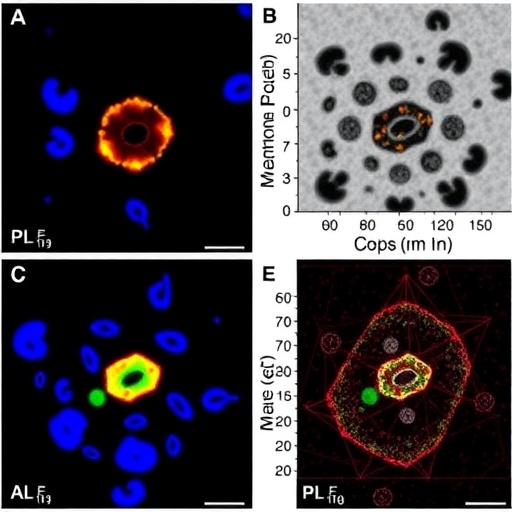Recent discoveries in cancer research have brought forth a plethora of insights into the intricate workings of cellular metabolism and its connection to cancer progression. One of the latest studies emerging from this field sheds light on the relationship between metabolic activity and mitochondrial temperature in hepatocellular carcinoma (HCC) cells, specifically HepG2 cells. Conducted by Gaser, Nasr, Hussein, and colleagues, this research highlights a critical aspect of cancer biology that could pave the way for innovative diagnostic approaches and therapeutic strategies.
Hepatocellular carcinoma stands as one of the most prevalent forms of liver cancer worldwide, with rising incidence rates linked to various risk factors, including chronic liver diseases and viral infections. The metabolic reprogramming of tumor cells has become a cornerstone in cancer biology, influencing not only tumor growth but also impacting the tumor microenvironment. This study investigates the dynamic changes in mitochondrial temperature as a consequence of altered metabolic activity in HepG2 cells, providing a fresh perspective amidst ongoing efforts to understand cancer metabolism.
At the heart of this investigation is the observation that cancer cells often exhibit heightened metabolic rates compared to their non-cancerous counterparts. Mitochondria, the energy powerhouse of the cell, play a pivotal role in this metabolic shift. By regulating ATP production and various biosynthetic pathways, mitochondria contribute to the overall energy homeostasis required for rapid cell proliferation. In this context, the study examines how fluctuations in metabolic activity directly influence mitochondrial temperature, a factor that may serve as a novel biomarker for cancer diagnostics.
The researchers employed advanced imaging techniques to measure mitochondrial temperature changes in real-time within HepG2 cells subjected to varying metabolic conditions. By utilizing tools such as fluorescence resonance energy transfer (FRET) technologies, they were able to derive quantitative measurements that provided unprecedented insights into the thermal dynamics of these cellular organelles. This innovative approach indicates a significant breakthrough in our understanding of mitochondrial function in cancer cells.
In their findings, the authors reported that increased metabolic activity correlates with elevated mitochondrial temperatures, suggesting an intrinsic link between energy utilization and thermal responses within the cell. This correlation further emphasizes the importance of metabolic reprogramming in cancer survival and growth, allowing tumor cells to adapt and thrive even under adverse conditions. This critical insight raises intriguing questions about the potential applications of mitochondrial temperature as a diagnostic marker.
Moreover, the study introduces a compelling narrative about the adaptability of cancer cells. In the face of fluctuating nutrient availability and the need for rapid growth, cells are equipped to alter their metabolic pathways, which in turn affects mitochondrial functions and thermal properties. Understanding these adaptive mechanisms could lead to targeted interventions that disrupt the metabolic flexibility of cancer cells, thereby hindering their ability to thrive.
As the research unfolds, it becomes clear that mitochondrial temperature could serve as a reliable indicator of metabolic alterations in cancer cells. This could revolutionize how we diagnose and monitor hepatocellular carcinoma, shifting from reliance on invasive procedures to potentially using non-invasive imaging techniques that monitor metabolic states in real-time. By offering a window into the cellular landscape of tumors, such diagnostic strategies could enhance precision medicine approaches.
Key to integrating this finding into clinical practice will be the establishment of standardized protocols for measuring mitochondrial temperature across various cancer types. The technical robustness demonstrated in this study serves as a foundation for future research endeavors aimed at exploring the relationship between mitochondrial thermal dynamics and cancer progression in broader contexts.
As the scientific community delves deeper into this frontier, the implications of this research extend beyond mere diagnostics. By elucidating the intricate interactions between metabolism and mitochondrial function, it opens avenues for the development of novel therapeutic agents designed to target metabolic vulnerabilities in cancer cells. Strategies that can selectively inhibit metabolic pathways or modulate mitochondrial function could prove transformative in managing hepatocellular carcinoma and perhaps other malignancies.
The broader impact of this research resonates with ongoing efforts to harness the power of metabolic modulation as a therapeutic strategy. As cancer cells become more adept at evading conventional treatments, the need for innovative approaches that exploit their metabolic weaknesses has never been more urgent. This study serves as a catalyst for such exploration, emphasizing the necessity of collaborative efforts to explore this new dimension of cancer treatment.
In conclusion, the work of Gaser et al. highlights the critical interplay between metabolic activity and mitochondrial temperature in HepG2 cells, presenting a promising avenue for new diagnostic and therapeutic strategies in hepatocellular carcinoma. By bridging the gap between metabolic reprogramming and thermal regulation, this research enriches our understanding of cancer biology and heralds a new era in the fight against cancer, where metabolic profiling could lead to life-saving advancements.
As we anticipate the next steps in this exciting research trajectory, the entire scientific community stands on the cusp of breakthroughs that could transform our approach to cancer diagnosis and therapy. Further investigation will not only validate these findings but also expand their applicability across diverse forms of cancer, promising a future where cancer treatment is more targeted, effective, and humane.
Subject of Research: Metabolic activity and mitochondrial temperature in HepG2 hepatocellular carcinoma cells.
Article Title: Alteration of metabolic activity regulates mitochondrial temperature in diagnosis in HepG2 hepatocellular carcinoma cells.
Article References:
Gaser, O.A., Nasr, M.A., Hussein, A.E. et al. Alteration of metabolic activity regulates mitochondrial temperature in diagnosis in HepG2 hepatocellular carcinoma cells. Sci Rep (2025). https://doi.org/10.1038/s41598-025-02807-0
Image Credits: AI Generated
DOI: 10.1038/s41598-025-02807-0
Keywords: Hepatocellular carcinoma, mitochondrial temperature, metabolic activity, cancer diagnostics, metabolic reprogramming.
Tags: cancer cell metabolismchronic liver disease and cancerenergy metabolism in cancer cellshepatocellular carcinoma researchHepG2 cell line studiesinnovative cancer diagnosticsmetabolic activity and cancer progressionmetabolic reprogramming in cancermitochondrial temperature in HepG2 cellsrole of mitochondria in cancertherapeutic strategies for liver cancertumor microenvironment dynamics





